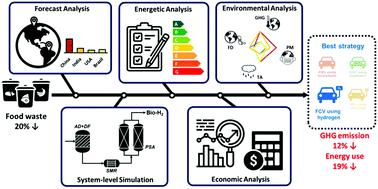当前位置:
X-MOL 学术
›
Energy Environ. Sci.
›
论文详情
Our official English website, www.x-mol.net, welcomes your feedback! (Note: you will need to create a separate account there.)
Food waste valorization to green energy vehicles: sustainability assessment
Energy & Environmental Science ( IF 32.5 ) Pub Date : 2021-5-14 , DOI: 10.1039/d1ee00850a Jaewon Byun 1, 2, 3, 4 , Oseok Kwon 1, 2, 3, 4 , Hoyoung Park 2, 3, 4, 5 , Jeehoon Han 1, 2, 3, 4, 5
Energy & Environmental Science ( IF 32.5 ) Pub Date : 2021-5-14 , DOI: 10.1039/d1ee00850a Jaewon Byun 1, 2, 3, 4 , Oseok Kwon 1, 2, 3, 4 , Hoyoung Park 2, 3, 4, 5 , Jeehoon Han 1, 2, 3, 4, 5
Affiliation

|
Increases in food waste (FW) and green vehicles (GV) due to population growth and social advancement can hinder realizing a sustainable society. This study proposes a systematic sustainable feasibility assessment that concentrates on an energetic, economic, and environmental aspect based decision-making framework to identify the best strategy of FW and transportaion management. This study compares four types of GV operations using green fuel from FW: internal combustion engine vehicles (ICEVs) using biomethane, ICEVs using bioethanol, fuel cell vehicles (FCVs) using biohydrogen, and plug-in electric vehicles using bioelectricity. The impact of FW processing combined with operating GV focusing on the four countries, namely, China, India, the USA, and Brazil, having the highest FW generation and vehicle population was analyzed for the near future. FCVs operation is the most sustainably-feasible regarding high potential driving distance (220–254 miles per tonne of FW), low economic cost potential (0.09–0.10 USD per mile) and high greenhouse gas reduction potential (3.0–4.8 kg CO2 per mile). 7.24 million FCVs can be operated using 20% (0.38 Gt) of the FW generated in the four countries by 2030, resulting in a 12.2% decrease in GHG emissions (0.05 Gt) and 18.6% in energy use (0.10 EJ).
更新日期:2021-06-13


























 京公网安备 11010802027423号
京公网安备 11010802027423号